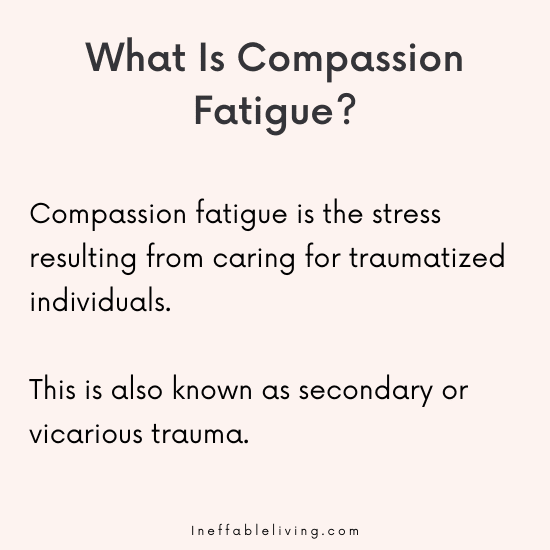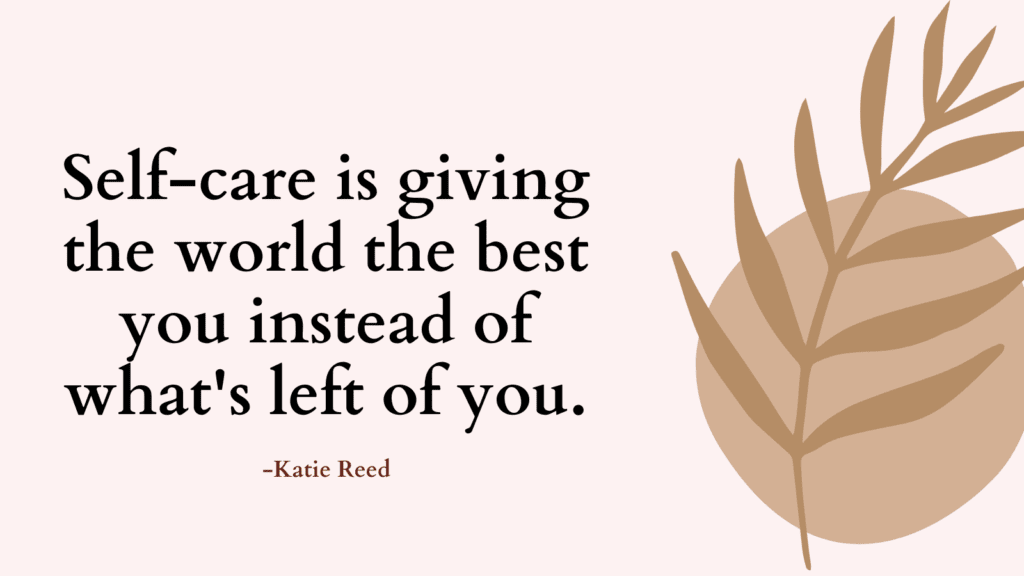This post contains “Compassion fatigue self test.”
What Is Compassion Fatigue?
Compassion fatigue is the stress resulting from caring for traumatized individuals.
This is also known as secondary or vicarious trauma.
The following is a list of some of the many who are at risk of burnout and compassion fatigue:
- Mental health counselor
- Psychologist
- School counselor
- Career counselor
- Addiction counselor
- Social worker
- Law enforcement professional
- Immigration attorney
- Family law attorney
- Physical therapist
- Teacher
- Human resources specialist
- Nurse
- Physician
Related: Resiliency Quiz: Am I Resilient?
What’s The Difference Between Burnout And Compassion Fatigue?
While both burnout and compassion fatigue may share some symptoms, compassion fatigue is the result of absorbing the suffering of others while burnout is usually related to administrative or organizational at work.
It is possible to have both burnout and compassion fatigue at the same time.
Caregivers may experience burnout due to administrative issues at work, and they may have compassion fatigue because of the exposure to the suffering of those with whom they work.
Both burnout and compassion fatigue, if unrecognized and unaddressed, can be likely to be incapacitating over a period of time.
Compassion Fatigue Self Test
The questions below represent common signs of compassion fatigue:
Results
#1. Do you often feel overwhelmed or powerless when hearing of others’ suffering?
#2. Do you often feel detached from your surrounding or from your internal experiences?
#3. Do you often feel emotionally or physically burnt out or numb?
#4. Do you often feel hypersensitive or insensitive to stories you hear from others?
#5. Do you find yourself constantly thinking or dwelling around the suffering of others?
#6. Are you experiencing a reduced sense of accomplishment or efficacy?
#7. Are you experiencing a loss of interest in activities you used to enjoy?
#8. Are you experiencing increased anxiety, anger, or irritability?
We will not sell your information. All results are kept confidential.
This quiz is for informational purposes only. It is not meant as a diagnostic or assessment tool.
Results
The questions above represent common signs of compassion fatigue. If you answered yes to most of these questions, then you may be experiencing compassion fatigue.
Related: How Resilience Works? Top 10 Powerful Ways to Stay Healthy and Happy During Tough Times

Who Is at Risk of Developing Compassion Fatigue?
Compassion fatigue can affect individuals in various helping professions or roles, such as healthcare providers, social workers, psychologists, therapists, counselors, teachers, humanitarian aid workers, and first responders.
However, it’s important to note that anyone who regularly engages in caregiving or supporting others can be susceptible to compassion fatigue.
Some factors that may increase the risk of developing compassion fatigue include:
1. High levels of empathy
Individuals with high levels of empathy often deeply feel and connect with others’ emotions and struggles.
While empathy is a vital quality for caregivers, it can also contribute to increased emotional exhaustion and compassion fatigue.
Related: How To Become A Stronger Empath? Top 20 Actionable Empathy Exercises to Become More Empathetic
2. Exposure to trauma and suffering
Constant exposure to traumatic events, extreme suffering, or intense emotional situations can overwhelm an individual’s ability to cope.
Repeatedly witnessing or hearing distressing stories can have a cumulative effect on one’s well-being.
3. Inadequate self-care
Neglecting self-care practices like relaxation, leisure activities, restful sleep, or healthy coping strategies can leave individuals vulnerable to compassion fatigue.
Failing to prioritize their own well-being can lead to emotional exhaustion.
4. Personal history of trauma
Individuals with a personal history of unresolved trauma or significant life stressors may have an increased susceptibility to compassion fatigue.
Unresolved personal issues can intersect with the emotional toll of caregiving, intensifying the risk.
Related: Top 9 Highly Sensitive Person Coping Strategies [HSP’s Survival Guide]
5. Lack of support
Limited social support, inadequate organizational support, or a lack of understanding from friends, family, or colleagues can contribute to higher levels of burnout and compassion fatigue.
6. High workload and time pressure
Feeling overwhelmed due to excessive workloads, long hours, or high-performance expectations can amplify stress levels and reduce the resources needed to recover from compassion fatigue.
7. Emotional investment
Those who are emotionally invested in their work, deeply caring about the well-being of others, may be more at risk.
The desire to help and make a difference can sometimes lead to neglecting personal boundaries and self-care.
It is essential to note that while these factors may contribute to an increased risk, they do not necessarily lead to the development of compassion fatigue.
Developing resilience and implementing self-care strategies can help mitigate these risks.
Related: Top Resources For Highly Sensitive Person (Tests, Support Groups, Books, Workbooks, Blogs, etc.)
How to Overcome Compassion Fatigue?
Here are some evidence-based strategies that can help you overcome compassion fatigue:
1. Self-Care
Prioritize self-care activities that restore your physical, emotional, and mental well-being.
Start by ensuring you get enough sleep, eat nutritious meals, and engage in regular exercise.
Sleep deprivation and poor nutrition can exacerbate stress and emotional exhaustion.
Physical activity has numerous benefits for mental health, such as reducing stress hormones and releasing mood-enhancing endorphins.
Related: Best 22 Self Care Products On Amazon
2. Set Boundaries
Establish clear boundaries between your personal and professional life. Learn to recognize and respect your limits.
It’s important to say no when you feel overwhelmed or when you’ve reached your capacity to provide care.
Take breaks and allow yourself time for rest and relaxation.
3. Practice Mindfulness
Incorporate mindfulness practices into your daily routine.
Mindfulness involves paying attention to the present moment without judgment.
Regular practice can help reduce stress, increase self-awareness, and improve overall well-being.
Consider activities like meditation, deep breathing exercises, or mindful walking.
These practices can help you stay grounded and connected with your own thoughts and emotions.
Related: Healthy Boundaries Quiz (+Free Pdf Worksheets)
4. Engage in Activities That Bring You Joy
Identify activities outside of work that bring you joy and fulfillment.
Engaging in hobbies, spending quality time with loved ones, or participating in activities aligned with your personal values can help replenish your emotional resources.
By nurturing your own interests and needs, you can establish a sense of balance and purpose beyond your professional responsibilities.
5. Develop Healthy Coping Strategies
Explore healthy ways to cope with stress and manage difficult emotions.
Everyone’s coping mechanisms differ, so it’s important to find options that work best for you.
Consider journaling, engaging in creative outlets (such as painting or playing an instrument), practicing gratitude, or seeking professional therapy.
Related: Best 99 Coping Skills (+FREE Coping Worksheets)
6. Seek Emotional Support
Find support from others who understand and empathize with your experiences.
Talking with friends, family, or colleagues can provide a safe space to share your thoughts and feelings.
Additionally, consider joining support groups or seeking professional therapy.
These avenues offer opportunities to process emotions, gain insights, and learn coping strategies from others facing similar challenges.
7. Engage in Reflective practice
Engage in regular self-reflection and self-awareness exercises.
Reflect on your thoughts, emotions, and reactions to better understand how to manage stress and maintain well-being.
Consider keeping a journal to track patterns and personal growth.
Related: Top 8 Common Triggers For Empaths
8. Take Regular breaks and vacations
Take regular breaks during work hours and plan vacations to recharge and rejuvenate.
Disconnecting from work responsibilities allows for rest and acts as a buffer against stress and burnout.

Conclusion
Compassion fatigue is a natural response to continuous exposure to the suffering of others, particularly in high-stress professions like healthcare, emergency services, or caregiving.
It can result in emotional exhaustion, decreased empathy, and a sense of hopelessness.
Overcoming compassion fatigue is an ongoing process that requires self-awareness, self-compassion, and a commitment to self-care.
It’s essential to prioritize yourself and address your own needs in order to sustain your ability to care for others effectively.







